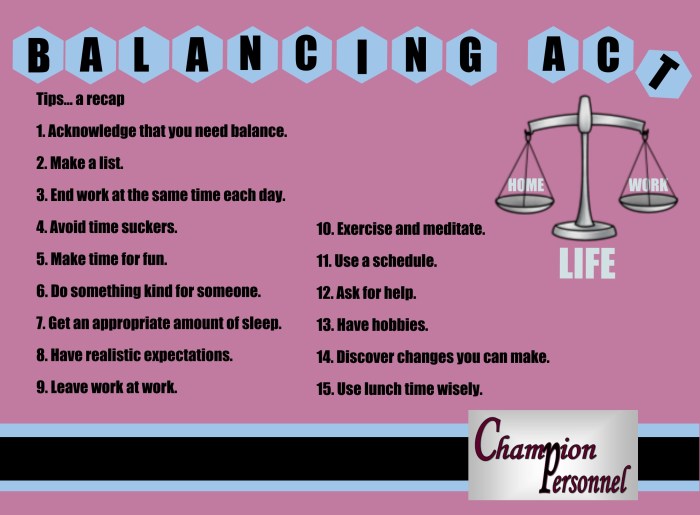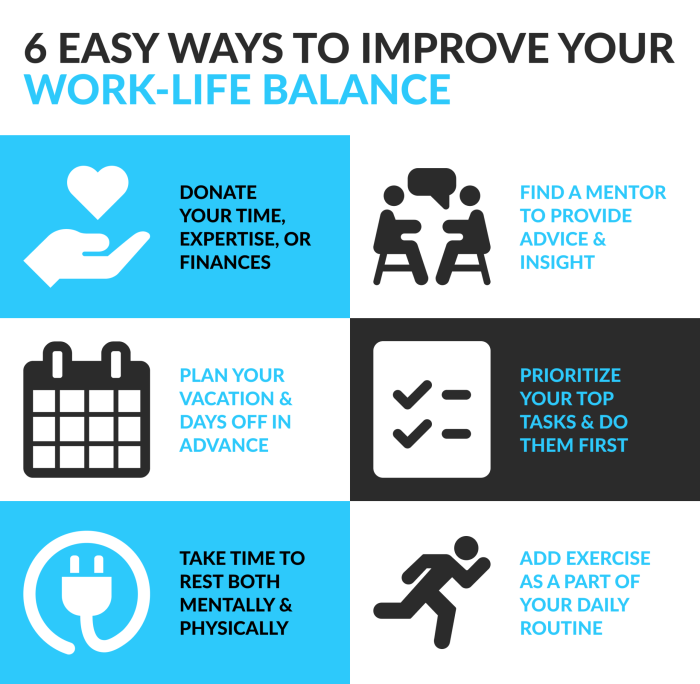Work-Life Balance Tips takes center stage, inviting readers into a world where juggling work and personal life is an art form. From the importance of balance to practical strategies, this guide dives deep into the realm of maintaining equilibrium.
Get ready to explore the key aspects of work-life balance and uncover valuable insights that can transform the way you approach your daily routines.
Importance of Work-Life Balance

Maintaining a healthy work-life balance is crucial for overall well-being. It ensures that individuals have time for work, relaxation, and personal activities, leading to a more fulfilling life.
Benefits of Work-Life Balance
- Increased Productivity: When individuals have a balanced life, they are more focused and efficient at work, leading to higher productivity levels.
- Improved Mental Health: A balance between work and personal life reduces stress and anxiety, promoting better mental health and overall well-being.
- Stronger Relationships: Spending quality time with family and friends strengthens relationships and creates a support system for individuals.
Negative Impact of Poor Work-Life Balance
- Burnout: Overworking without taking breaks can lead to burnout, causing physical and emotional exhaustion.
- Strained Relationships: Neglecting personal relationships due to work commitments can strain relationships and lead to feelings of isolation.
- Decreased Productivity: Working excessively without rest can actually decrease productivity in the long run, as individuals become fatigued and less motivated.
Strategies for Achieving Work-Life Balance: Work-Life Balance Tips
Achieving work-life balance is essential for overall well-being and productivity. By implementing effective strategies, individuals can ensure they are able to manage their time efficiently, set boundaries, and prioritize self-care practices.
Time Management Techniques, Work-Life Balance Tips
- Utilize a planner or calendar to schedule work tasks and personal activities.
- Break down tasks into smaller, manageable chunks to avoid feeling overwhelmed.
- Set realistic deadlines and prioritize tasks based on importance and urgency.
- Avoid multitasking and focus on one task at a time to improve efficiency.
Setting Boundaries
- Establish specific work hours and avoid working outside of those designated times.
- Communicate with colleagues and supervisors about your availability and need for personal time.
- Create a designated workspace at home to separate work from personal life.
- Learn to say no to additional tasks that may interfere with your work-life balance.
Importance of Self-Care Practices
- Make time for activities that help you relax and recharge, such as exercise, meditation, or hobbies.
- Prioritize getting enough sleep and maintaining a healthy diet to support overall well-being.
- Take regular breaks throughout the day to prevent burnout and maintain focus.
- Seek support from friends, family, or a therapist if you are feeling overwhelmed or stressed.
Remote Work and Work-Life Balance

Remote work has significantly impacted the work-life balance of many individuals. With the flexibility to work from home or any location, it has blurred the lines between work hours and personal time, creating both opportunities and challenges.
Influence of Remote Work
- Increased flexibility in setting work hours and location
- Reduction in commuting time leading to more time for personal activities
- Ability to create a customized work environment for better productivity
Challenges Faced by Remote Workers
- Difficulty in setting boundaries between work and personal life
- Feeling of being always “on” and struggling to disconnect from work
- Lack of social interaction and potential feelings of isolation
Strategies for Maintaining Work-Life Balance as a Remote Worker
- Establish a dedicated workspace at home to create a separation between work and personal life
- Set specific work hours and stick to a routine to maintain a sense of structure
- Take regular breaks to avoid burnout and maintain mental well-being
- Engage in social activities outside of work to combat feelings of isolation
Work-Life Balance for Entrepreneurs and Business Owners
Entrepreneurs and business owners often face unique challenges when it comes to achieving work-life balance. The demands of running a business can be all-consuming, making it difficult to switch off and prioritize personal time. However, maintaining a healthy work-life balance is crucial for long-term success and overall well-being.
Delegating Tasks and Time Management
One key tip for entrepreneurs is to learn how to delegate tasks effectively. It can be tempting to try and do everything yourself, but this can quickly lead to burnout. Identify tasks that can be outsourced or delegated to others, allowing you to focus on high-priority activities that require your expertise.
Additionally, time management is essential for entrepreneurs looking to balance work and personal life. Create a schedule that allocates time for work, relaxation, and family commitments. Use tools like time-tracking apps or productivity techniques to help you stay organized and make the most of your day.
Prioritizing Tasks and Setting Realistic Goals
Another important aspect of work-life balance for entrepreneurs is prioritizing tasks and setting realistic goals. Learn to differentiate between urgent and important tasks, and focus on completing the most critical ones first. This will help you avoid feeling overwhelmed and ensure that you are making progress towards your business objectives without sacrificing personal time.
Setting realistic goals is also key to maintaining work-life balance. Be honest with yourself about what you can achieve in a given timeframe, and don’t be afraid to adjust your goals as needed. By setting achievable milestones, you can reduce stress and prevent burnout, ultimately leading to a more sustainable work-life balance.